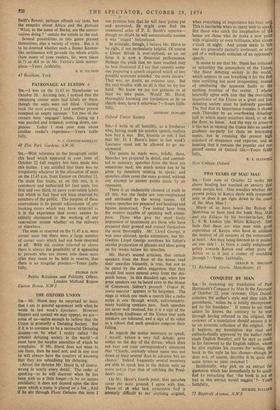SIR,—I write in all humility, as a freshman who, having
made his maiden speech, realises how bad it was. But, humble or not, I feel that Mr. D. J. Hurst's letter in last week's Spectator must not be allowed to go un- answered.
The points he made were, briefly, these. Speeches are prepared in detail, and commit- ted to memory; speeches from the floor are sometimes read; too much notice has to be given by members wishing to speak; and speeches often cover the same ground, without any attempt to answer points made by an opponent.
There is an undeniable clement of truth in all this, but the faults are over-emphasised and attributed to the wrong causes. Of course speeches are prepared and headings and figures memorised. Fcw indeed have been the orators capable of speaking well extem- pore. Those who give the most lively impression of spontaneity are those who have prepared their ground and trained themselves the most thoroughly. Mr. Lloyd George, it was once claimed, spoke extempore, but Mr. Gwilym Lloyd George mentions his father's careful preparation of phrases and ideas going on for weeks before his speeches.
Mr. Hurst's second criticism, that certain speakers from the floor of the house read their speeches blatantly, is true, but not to be cured by the naïve suggestion that they would feel more natural away from the des- patch boxes. In this decadent age, when few great speakers can be heard even in the House of Commons, Sidney's proverb ' Orator fit, poeta nascitur' appears to he forgotten. The stage at which one reads a speech like a radio script is one through which, unfortunately, many budding speakers pass. Such speeches are never well received, but it is a sign of the underlying kindliness of the Union that such speakers are tolerated, and a sign of its value as a school that such speakers outgrow their failing.
As regards the notice necessary to speak, I myself, before a very full debate, gave notice on the day of the debate, which does not hear out yOur correspondent's statement that ' Clearly, anybody whose name was not down at least several days in advance has no chance.' Indeed, frequently several members are able to speak late in the debate with no more not.:= than that of catching the Presi- dent's eye.
On Mr. Hurst's fourth point, that speeches cover the same ground, I agree with him. Those of IA who lack extscrience find it intensely difficult to say anything original, when everything of importance has been sai This is inevitable when so many wish to spca. But those who catch the imagination of tb house are those who do make a new point with originality or even brilliance, after eleven o'clock at night. And points made in this way are generally partially irrelevant, or arise out of a well-made criticism of an opponent's speech. It seems to me that Mr. Hurst-has criticised as unhealthy the atmosphere of the Union, ' the finest debating society in the world, which appears to one breathing it for the first time terrifying but most invigorating, instead of attributing the apparent faults to the teething troubles of the orator. I whole" heartedly agree with him that the overriding importance of the Union as a great and free debating society must be jealously guarded, The fact that its importance remains is shown each Thursday by an overflowing debating' hall in which many members stand, or sit on the floor, to listen. And the way to preserve it lies not in turning the Union into an under. graduate tea-party for chats on interesting topics, but in retaining the present high standard of eloquence and repartee, and 50 insuring that it remains the popular and res4 pected centre of Oxford lifc.—Yours faith' fully,
R. L MAXWELL


































 Previous page
Previous page